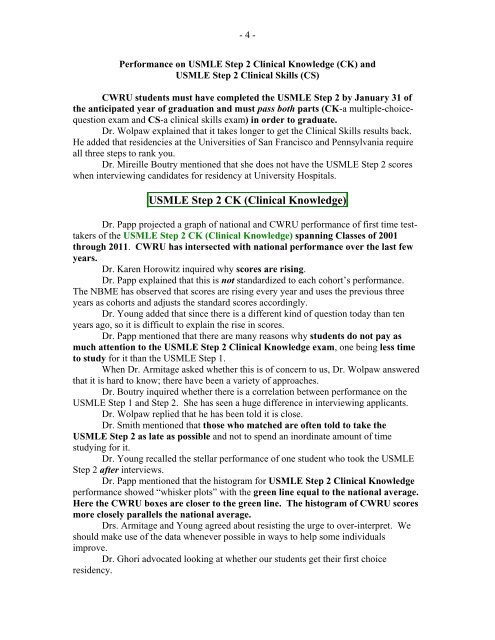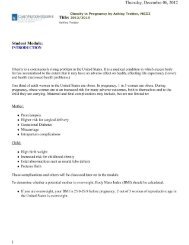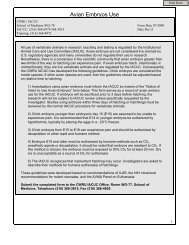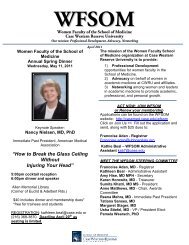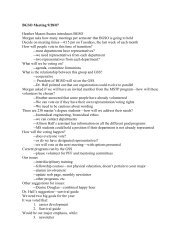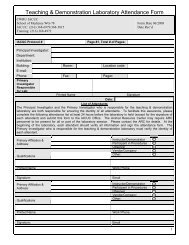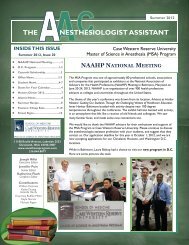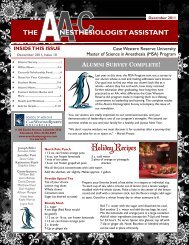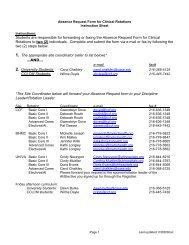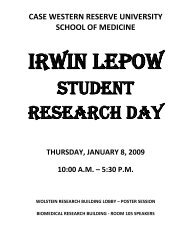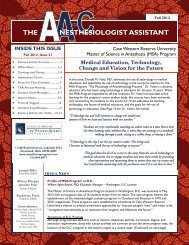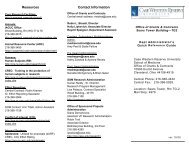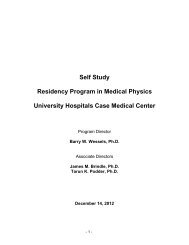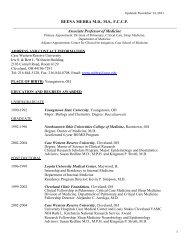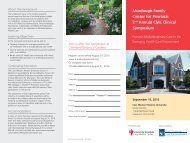4-28-2011 - Case Western Reserve University School of Medicine
4-28-2011 - Case Western Reserve University School of Medicine
4-28-2011 - Case Western Reserve University School of Medicine
You also want an ePaper? Increase the reach of your titles
YUMPU automatically turns print PDFs into web optimized ePapers that Google loves.
- 4 -<br />
Performance on USMLE Step 2 Clinical Knowledge (CK) and<br />
USMLE Step 2 Clinical Skills (CS)<br />
CWRU students must have completed the USMLE Step 2 by January 31 <strong>of</strong><br />
the anticipated year <strong>of</strong> graduation and must pass both parts (CK-a multiple-choicequestion<br />
exam and CS-a clinical skills exam) in order to graduate.<br />
Dr. Wolpaw explained that it takes longer to get the Clinical Skills results back.<br />
He added that residencies at the Universities <strong>of</strong> San Francisco and Pennsylvania require<br />
all three steps to rank you.<br />
Dr. Mireille Boutry mentioned that she does not have the USMLE Step 2 scores<br />
when interviewing candidates for residency at <strong>University</strong> Hospitals.<br />
USMLE Step 2 CK (Clinical Knowledge)<br />
Dr. Papp projected a graph <strong>of</strong> national and CWRU performance <strong>of</strong> first time testtakers<br />
<strong>of</strong> the USMLE Step 2 CK (Clinical Knowledge) spanning Classes <strong>of</strong> 2001<br />
through <strong>2011</strong>. CWRU has intersected with national performance over the last few<br />
years.<br />
Dr. Karen Horowitz inquired why scores are rising.<br />
Dr. Papp explained that this is not standardized to each cohort’s performance.<br />
The NBME has observed that scores are rising every year and uses the previous three<br />
years as cohorts and adjusts the standard scores accordingly.<br />
Dr. Young added that since there is a different kind <strong>of</strong> question today than ten<br />
years ago, so it is difficult to explain the rise in scores.<br />
Dr. Papp mentioned that there are many reasons why students do not pay as<br />
much attention to the USMLE Step 2 Clinical Knowledge exam, one being less time<br />
to study for it than the USMLE Step 1.<br />
When Dr. Armitage asked whether this is <strong>of</strong> concern to us, Dr. Wolpaw answered<br />
that it is hard to know; there have been a variety <strong>of</strong> approaches.<br />
Dr. Boutry inquired whether there is a correlation between performance on the<br />
USMLE Step 1 and Step 2. She has seen a huge difference in interviewing applicants.<br />
Dr. Wolpaw replied that he has been told it is close.<br />
Dr. Smith mentioned that those who matched are <strong>of</strong>ten told to take the<br />
USMLE Step 2 as late as possible and not to spend an inordinate amount <strong>of</strong> time<br />
studying for it.<br />
Dr. Young recalled the stellar performance <strong>of</strong> one student who took the USMLE<br />
Step 2 after interviews.<br />
Dr. Papp mentioned that the histogram for USMLE Step 2 Clinical Knowledge<br />
performance showed “whisker plots” with the green line equal to the national average.<br />
Here the CWRU boxes are closer to the green line. The histogram <strong>of</strong> CWRU scores<br />
more closely parallels the national average.<br />
Drs. Armitage and Young agreed about resisting the urge to over-interpret. We<br />
should make use <strong>of</strong> the data whenever possible in ways to help some individuals<br />
improve.<br />
Dr. Ghori advocated looking at whether our students get their first choice<br />
residency.


